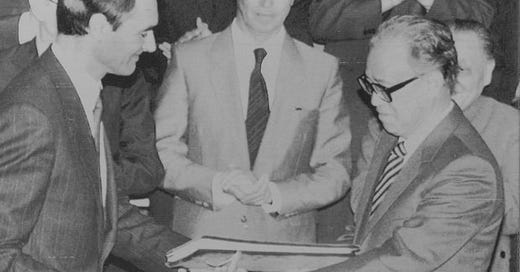This Week in China's History: The Sino-Portuguese Joint Declaration
March 27, 1987
Listen to Kaiser’s narration in the embedded player above!
The world order has been shaken lately. America’s president has suggested that economic, or even military, force could be used to expand American power overseas, eying Greenland, Panama, and even Gaza. Russian aggression against Ukraine has provoked widespread — but not universal — condemnation, and yet American leaders have suggested that it is “unrealistic” to expect Russia to return conquered Ukrainian territory. These, and other, actions suggest that the world’s leaders seem to be regaining their appetite for colonialism, or at least that those appetites are more acceptable than has been the case for some time.
These actions — though shocking in many cases — don’t constitute a return to the era of colonialism, but they might give us a moment to reflect that perhaps the anti-colonial mindset that has dominated the last century ought not be taken for granted. With that in mind, This Week in China’s History looks back to March 26, 1987, when Chinese and Portuguese diplomats concluded their talks and issued a Joint Declaration on the future of Macau: on December 20, 1999, Portugal’s formal presence in Macau would end, drawing the curtain on four centuries of European (and Japanese) colonialism in China.
The end of Portuguese rule over Macau is thus easy to pinpoint, but the same cannot be said of its origins. The Portuguese were the first Europeans to encounter China via sea during this era, reaching Lintin Island, in the Pearl River estuary, in 1513. These first Portuguese settlements on China’s southern coast were expelled after the 1521 Battle of Tunmen, but they returned and established a trading base at Shangchuan Island (上川岛, St John’s Island) in 1537, about 50 miles southwest of Macau. Shangchuan would come to be known as the site where St Francis Xavier, the prominent Spanish Jesuit, died. But even before that, the Portuguese had abandoned Shangchuan and relocated to Langbaiao, just a few miles from Macau. There, they conducted trade with Japan, but always with an eye toward the more favorable port of Macau. Portuguese sailors first went ashore in 1553, and in 1557 leased the territory from the Ming, but from the start the arrangement was less formal, and less confrontational, than most colonial ventures.
Keep reading with a 7-day free trial
Subscribe to Sinica to keep reading this post and get 7 days of free access to the full post archives.






